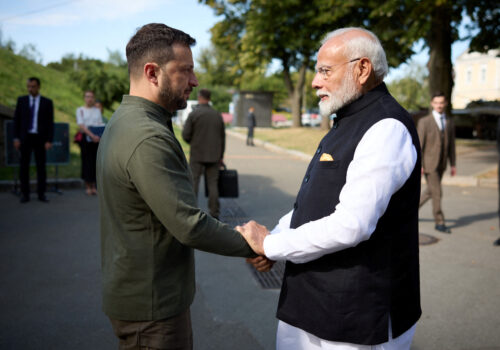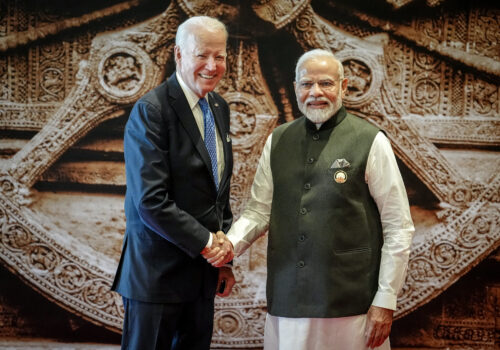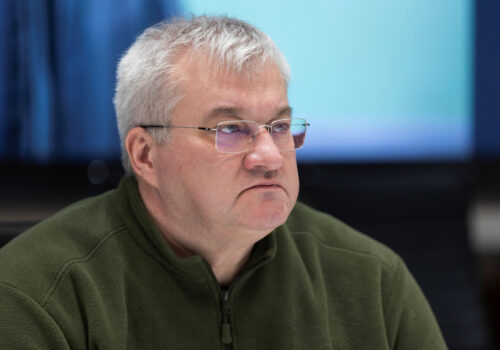Why Zelenskyy should visit India (and what he should focus on once he is there)
Ukraine’s ambassador to India, Oleksandr Polishchuk, caused a stir in the Indian press this week when he said that Ukrainian President Volodymyr Zelenskyy might visit India by the end of the year. Should it take place, the visit would follow Indian Prime Minister Narendra Modi’s visit to Kyiv in August, and his meeting with Russian President Vladimir Putin in Moscow in July. A visit by Zelenskyy would be sure to capture a lot of attention, but to make substantive progress in developing Ukraine-India relations, the agenda will need to focus on commonalties and opportunities.
Zelenskyy’s statements to the press on August 23, just as Modi was leaving Ukraine, bode well for a future visit by the Ukrainian president to India. Zelenskyy said he wished to connect with India and wanted to know more about its people. But for Zelenskyy to build on Modi’s visit to strengthen his country’s relations with India, there are several factors that will be key to understanding the country and connecting with Indians.
Most importantly, India does not believe in the idea of “with us or against us.” From former Prime Minister Jawaharlal Nehru’s policy of nonalignment to Modi’s all-alignment, India has a long foreign policy tradition of charting its own course, separate from geopolitical blocs. As Indian Foreign Minister S. Jaishankar stated, “India is non-West and not anti-West.” India is unlikely to take the exact position Zelenskyy is asking for—whether being fully critical of Putin’s Russia or stopping the import of Russian oil.
Vishwa Mitra (a friend to all)
The United States has been coming to terms with this Indian thought process for the past few decades. India holds paramount its decision-making sovereignty and will insist on choosing its own path. As Atlantic Council President Frederick Kempe wrote, “The strength of the US-India relationship depends in no small part on how Washington will balance its strategic ambitions with India’s determination to remain an independent actor.” This adage applies to every country with which India engages. Kempe voiced concerns about Modi’s trip to Russia. But Modi’s Ukraine visit stood out as a signal of greater engagement with the country, especially with the simultaneous visit by Indian Defense Minister Rajnath Singh to the United States. This signaled the growing US-India defense relationship, a validation of India’s desire to not be militarily dependent on any nation. As such, to foster greater engagement between India and Ukraine, there are three areas where they can build a meaningful partnership.
Appeal to cultural ties
First, Zelenskyy should appeal to Indian heritage. This would appeal not just to Indians in India but to Indians abroad as well. Many leaders in the West have done this effectively. For example, Indians loved it when then President Barack Obama spoke Hindi, or when then President Donald Trump did it. Vice President Kamala Harris went further, speaking about her Indian heritage, which was also well received in the country. Italian Prime Minister Giorgia Meloni has gained political notoriety by jumping on the “#Melodi” bandwagon, celebrating an apparent great rapport between her and the Indian prime minister. Meloni does not need these soft power brownie points, but Zelenskyy could use them.
Indian culture is expansive and eager to share the kinds of friendly hugs Modi gives all world leaders, including Zelenskyy. For example, Zelenskyy could reference the 2023 Oscar-winning song “Naatu Naatu,” an India-Ukraine cultural connection that Indians are proud of. The song was shot in front of the Mariinskyi Palace, the Ukrainian presidential palace, months before Russia’s full-scale invasion. An appeal along the lines of expressing a desire for more Indian movies celebrating such a connection could go a long way. Celebration is undoubtedly a tough theme to bring up during wartime. But the point is to both showcase the past and a future where Ukrainians share cultural ties with Indians—both those in India and abroad, especially in the United States.
Emphasize shared history
Second, Zelenskyy ought to stake claims to the historical connections between India and Ukraine, even to parts of the closeness India had with the erstwhile Soviet Union. The Soviet Union had a successful program of translating its books into regional Indian languages and distributing them widely. During the Cold War, India had a closed-off economy and was less connected to Western creative output. Indians who grew up in the 1960s, 1970s, and 1980s read a significant amount of Soviet literature in their native languages. These Indians are also the generation currently at the helm of the Indian polity. Sparking that literary conversation would create useful reminders.
Moreover, Zelenskyy should emphasize the history of Soviet domination of Ukraine, including repression of its language, history, and people. This is one of the most powerful ways to connect with India—a country with a proud diversity of languages where many states were formed based on their linguistic identities. India is also proud of its educational and medical ambitions. At a time when the medical education system and doctor security are front and center in India, Zelenskyy has an opportunity to be an ally in the field, highlighting Indian medical students coming to Ukraine in the past and again expressing an opportunity for them to return. Ukraine had more than nineteen thousand Indian students before Russia’s full-scale invasion. Zelenskyy could use this to underscore a stark contrast between Ukraine and Russia; while the Russian army is forcing Indians into fighting for it, Kyiv wants to support the education of Indian doctors.
Staking some claim to the historical closeness India enjoyed with the erstwhile Soviet Union is not only factually accurate but also something Ukrainian allies in the West would likely encourage. It would also be a step toward the potential visit by Zelenskyy to India. While Modi visited Ukraine on Ukraine’s flag day, a day before Ukraine’s Independence Day, the biggest form of outreach from India would be inviting Zelenskyy as the chief guest to India’s Republic Day parade on January 26, 2025. This has been India’s key method of honoring world leaders, like with French President Emmanuel Macron this year. Other than France, the United States, Egypt, the United Arab Emirates, Brazil, South Africa, and Japan have been invited in recent years to signal strong ties. Putin was accorded the honor only in 2007.
Build the relationship on food security
Third, Zelenskyy should talk about food security. With the largest population of any country in the world, India needs to ensure food safety for almost 1.5 billion Indians. India is also the world’s second-largest consumer and largest importer of edible oil. According to the Indian Embassy in Kyiv, India is Ukraine’s largest export destination in the Asia Pacific. A full 85 percent of sunflower oil imports to India were from Ukraine from November 2021 to February 2022, for example. Overall, India was Ukraine’s third-biggest agricultural market behind the European Union and China. Of the four documents that Modi and Zelenskyy signed during the former’s visit to Ukraine, perhaps the most important is a five-year agreement on expanding agricultural cooperation.
Food security is a paramount concern for the Indian government. Agricultural cooperation also creates a continuous point of conversation that keeps up the gradual drumbeat of India-Ukraine cooperation.
Modi’s visit to Ukraine was historic—the first ever by an Indian prime minister since Ukraine regained its independence in 1991. A visit by Zelenskyy to India would also be an important milestone in building up the India-Ukraine relationship.
Srujan Palkar is a program assistant at the Atlantic Council’s South Asia Center.
Further reading
Wed, Sep 4, 2024
Indian PM Modi visits Ukraine to open new foreign policy horizons
UkraineAlert By
Indian PM Narendra Modi paid an historic visit to Kyiv in late August as Delhi seeks to counter negative perceptions of its close economic and defense ties with Moscow and underline its status as an emerging geopolitical power in its own right, writes Mridula Ghosh.
Wed, Feb 21, 2024
It’s a new era for US-India relations, except at the WTO. That needs to change.
New Atlanticist By Mark Linscott
Now is the time for the United States and India to build on bilateral successes to find common ground in the World Trade Organization.
Tue, Sep 10, 2024
Ukraine’s biggest wartime government shakeup prompts muted reaction in Kyiv
UkraineAlert By Andrew D’Anieri
Ukrainian President Volodymyr Zelenskyy presided over his government’s largest wartime reshuffle in early September, with nine ministries getting new permanent leadership, writes Andrew D’Anieri.
Image: Ukrainian President Volodymyr Zelenskyy (R) shakes hands with Indian Prime Minister Narendra Modi in Kyiv on Aug. 23, 2024. (Kyodo)


